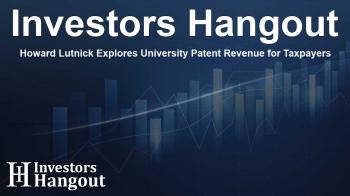Howard Lutnick Explores University Patent Revenue for Taxpayers

Howard Lutnick Advocates for Share in University Patents
Howard Lutnick, the U.S. Commerce Secretary, has put forth a compelling argument suggesting that the federal government should seek a percentage of profits from patents developed at top universities that have received federal funding. This innovative idea comes from Lutnick's discussions on ‘The Axios Show’ with journalist Mike Allen.
Potential Shift in Federal Patent Policy
Lutnick’s statement indicates a proactive stance by the current administration to secure economic returns from public investments in research. According to his comments, the government has already benefited from profits related to Intel INTC and Nvidia NVDA, and extending these benefits to university patents is the next logical step.
White House Review of Federal Funds in Education
In light of Lutnick's proposals, he emphasized that despite significant funding from the U.S. government, which channels around $50 billion into scientific research, benefits from patents primarily accrue to the scientists and the universities.
Taxpayer Rights in Intellectual Property
“America should participate,” Lutnick argued. “How do we not get our money back? That’s insane,” he reiterated, calling for a fairer distribution of financial returns on taxpayer-funded research.
Implications of Changes in Patent Ownership
The potential policy shift has raised concerns regarding its impact on the academic landscape. By aiming to claim a share of these patents, the administration may alter existing frameworks established by the Bayh-Dole Act of 1980, which has allowed universities to retain patent rights stemming from federal funds.
Revenue Generation vs Incentives for Innovation
While capturing a share of patent revenues could yield a lucrative stream of income for the government, there are concerns that this move might deter universities from engaging in groundbreaking research and development efforts. A comprehensive study conducted by Joshua M. Pearce highlighted that many universities could derive more financial benefits by focusing on research grants rather than exclusive patent commercialization due to the associated challenges and costs.
Lutnick’s Direct Engagement with Universities
As part of this initiative, Lutnick has already contacted Harvard University to obtain a complete list of patents resulting from federally financed research projects. He plans to pursue similar communications with the University of California system. This indicates that the administration's intent could lead to a broader framework as discussions evolve with additional higher education institutions.
Reactions from Political Spectrum
The proposal's reception has varied among political figures, with some praising the move while others express concern. Notably, Senator Rand Paul has broadcasted fears that such governmental involvement may edge toward socialism and infringe on private sector operations.
Conversely, Senator Bernie Sanders has endorsed the administration’s actions, asserting that if leading chip manufacturers profit from federal grants, American taxpayers deserve a corresponding return on investment.
Future of Patents in University Settings
The administration's aim to involve itself more directly in the domain of university patents comes at a pivotal time for both educational institutions and the government. As discussions about granting shares of patent revenues unfold, it becomes critical for stakeholders in the higher education sector to evaluate the long-term implications of such a shift. Balancing the need for government returns while encouraging innovation will require careful navigation.
Conclusion: A New Era for University Research Funding
As we move forward, the dialogue surrounding university patents and federal investment is poised to evolve. Lutnick’s vocal advocacy for taxpaying citizens highlights a shift toward increased accountability and potential profit-sharing from university-generated innovations. This proposal symbolizes a larger trend toward rethinking how public funds translate into private and institutional successes.
Frequently Asked Questions
What is Lutnick's proposal regarding university patents?
Howard Lutnick suggests that the federal government should claim a share of profits from patents developed at universities using federal funding.
How might this change impact universities?
The proposed policy could challenge existing frameworks that allow universities to retain ownership of patents, possibly affecting their incentive to innovate.
What are the potential benefits of this proposal for taxpayers?
This initiative aims to ensure that taxpayers receive returns on their investments in scientific research funded by the government.
What are some concerns raised by this proposal?
There are concerns that confiscating patent revenues could deter universities from conducting research, impacting technological advancement.
Who has supported or criticized the proposal?
Some Republicans, like Senator Rand Paul, criticize the move as socialism, while figures like Bernie Sanders support it as a fair return for taxpayers.
About The Author
Contact Olivia Taylor privately here. Or send an email with ATTN: Olivia Taylor as the subject to contact@investorshangout.com.
About Investors Hangout
Investors Hangout is a leading online stock forum for financial discussion and learning, offering a wide range of free tools and resources. It draws in traders of all levels, who exchange market knowledge, investigate trading tactics, and keep an eye on industry developments in real time. Featuring financial articles, stock message boards, quotes, charts, company profiles, and live news updates. Through cooperative learning and a wealth of informational resources, it helps users from novices creating their first portfolios to experts honing their techniques. Join Investors Hangout today: https://investorshangout.com/
The content of this article is based on factual, publicly available information and does not represent legal, financial, or investment advice. Investors Hangout does not offer financial advice, and the author is not a licensed financial advisor. Consult a qualified advisor before making any financial or investment decisions based on this article. This article should not be considered advice to purchase, sell, or hold any securities or other investments. If any of the material provided here is inaccurate, please contact us for corrections.

